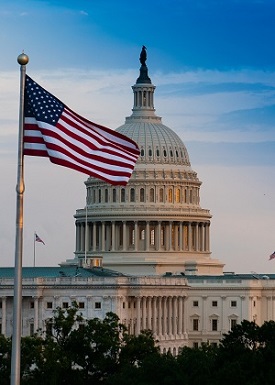Newsroom
Legislation to clarify PPP tax deductions introduced in Senate
 A bipartisan group of senators Wednesday introduced legislation – the Small Business Expense Protection Act – that would clarify small businesses can deduct eligible expenses that were paid for by forgivable paycheck protection program (PPP) loans from their taxes.
A bipartisan group of senators Wednesday introduced legislation – the Small Business Expense Protection Act – that would clarify small businesses can deduct eligible expenses that were paid for by forgivable paycheck protection program (PPP) loans from their taxes.
PPP loans, created by the Cares Act, are intended to be used by small businesses to cover payroll costs and other employee benefits, as well as some facility and operational costs – many of which are usually tax deductible. PPP borrowers can apply for forgiveness in an amount equal to the sum of these costs during the eight-week period from loan origination.
However, the IRS last week released a notice stating that businesses that receive a loan through the program cannot deduct otherwise tax-deductible expenses if the payment of the expense results in forgiveness of a covered PPP loan. The IRS notice references a section of the Internal Revenue Code that prevents double tax benefits.
If passed, the proposed legislation, introduced by Sens. Chuck Grassley, R-Iowa, Marco Rubio, R-Fla., Ron Wyden, D-Ore., John Cornyn, R-Texas, and Tom Carper, D-Del., would make clear that businesses can deduct items such as wages and rent that were paid by with PPP loan funds and invalidate the IRS notice. A similar bill has been introduced in the House by Rep. Lizzie Fletcher, D-Texas.
NAFCU is actively engaged on Capitol Hill as lawmakers continue to discuss potential additional funding for the PPP and other changes. The association also has a frequently updated FAQ document on the program, designed to keep credit unions up to date on the latest information, and a free webinar, available on-demand, to help credit unions better understand the process for offering loans.
Share This
Related Resources
Add to Calendar 2024-06-26 14:00:00 2024-06-26 14:00:00 Gallagher Executive Compensation and Benefits Survey About the Webinar The webinar will share trends in executive pay increases, annual bonuses, and nonqualified benefit plans. Learn how to use the data charts as well as make this data actionable in order to improve your retention strategy. You’ll hear directly from the survey project manager on how to maximize the data points to gain a competitive edge in the market. Key findings on: Total compensation by asset size Nonqualified benefit plans Bonus targets and metrics Prerequisites Demographics Board expenses Watch On-Demand Web NAFCU digital@nafcu.org America/New_York public
Gallagher Executive Compensation and Benefits Survey
preferred partner
Gallagher
Webinar
Add to Calendar 2024-06-21 09:00:00 2024-06-21 09:00:00 2024 Mid-Year Fraud Review Listen On: Key Takeaways: [01:16] Check fraud continues to be rampant across the country. Card fraud is affecting everyone. [04:31] Counterfeit US passport cards are just another new toolbox in the bad actors’ toolbox. [07:21] Blocking the fallback is the only way to defeat counterfeit cards. [11:17] The best way is constant education to your members in as many channels as you can. [13:02] We are still seeing overdraft lawsuits. Make sure the programming you have at your credit union matches what you have displayed for the members. Web NAFCU digital@nafcu.org America/New_York public
2024 Mid-Year Fraud Review
Strategy & Growth, Consumer Lending
preferred partner
Allied Solutions
Podcast
Add to Calendar 2024-06-21 09:00:00 2024-06-21 09:00:00 The Evolving Role of the CISO in Credit Unions Listen On: Key Takeaways: [01:30] Being able to properly implement risk management decisions, especially in the cyber age we live in, is incredibly important so CISOs have a lot of challenges here. [02:27] Having a leader who can really communicate cyber risks and understand how ready that institution is to deal with cyber events is incredibly important. [05:36] We need to be talking about risk openly. We need to be documenting and really understanding what remediating risk looks like and how you do that strategically. [16:38] Governance, risk, compliance, and adherence to regulatory controls are all being looked at much more closely. You are also seeing other technology that is coming into the fold directly responsible for helping CISOs navigate those waters. [18:28] The reaction from the governing bodies is directly related to the needs of the position. They’re trying to help make sure that we are positioned in a way that gets us the most possibility of success, maturing our postures and protecting the institutions. Web NAFCU digital@nafcu.org America/New_York public
The Evolving Role of the CISO in Credit Unions
preferred partner
DefenseStorm
Podcast
Get daily updates.
Subscribe to NAFCU today.
